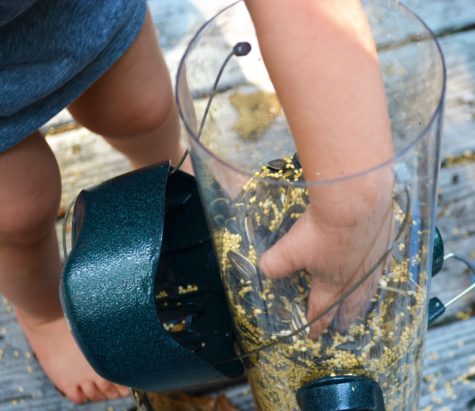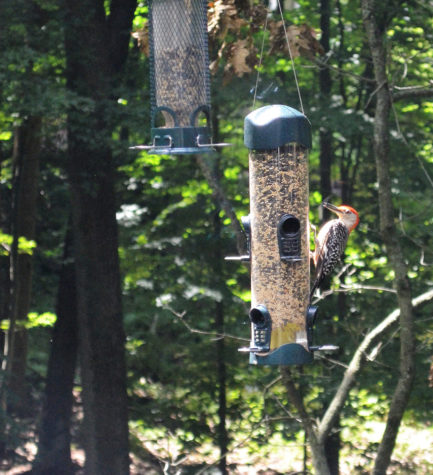
Two birdfeeders hang from the deck of my house in the woods, a waystation for locals and migrants alike. They are a locus of activity — except when I forget to refill them. That happened again last month. I grew too distracted by the daily feeding and maintenance of two small humans, both of whom must be fed and bathed and clothed and entertained and educated and not-always-successfully prevented from jumping off furniture.
My small humans love to watch the birdfeeders and even help refill them, one small fistful of seed at a time, but they don’t always have time for such mundane household tasks. So, for two weeks, the feeders hung empty and quiet, the feathered action instead dispersed throughout the trees overhead.
But long after the chickadees and nuthatches had given up, a couple of red-bellied woodpeckers continued to drop by. The red-belly is one of my favorites, a bird that belies its name, with just the barest blush of pink on its belly and a startlingly bright red head. There were two of them, a female and a male, identifiable by the different-sized patches of red on their head and neck. And they were clearly a pair. Rather than fighting, they took turns: one dangling from the bottom of the feeder, its long beak digging out the few seeds that remained, while the other hammered away at the branches of a nearby chestnut oak.
When I finally refilled the feeders last week, the chunky red-bellies were my first visitors. Back and forth they flew from their chestnut tree, back and forth, chugging seed as fast as they could. They seemed hungrier than normal but it took me a couple of days to figure out why.

I heard the little one before I saw her, her cry a constant eeeeeeeh, eeeeeeeh, eeeeeeeh. There she was in the oak tree, begging and hopping clumsily from trunk to branch. Bits of fluff stuck out from underneath mature feathers, and her juvenile black, white, and tawny brown plumage lacked a distinctive red cap. She was a baby, a fledgling red-belly, and she was hungry.
Mom and dad flew back and forth from feeder to oak tree, eating seed then regurgitating it for her. Eeeeeeeh, eeeeeeh, eeeeeeh. They continued, feeder to tree, feeder to tree, stuffing seed into her little mouth every minute or two but the begging didn’t stop. She followed them among the branches and watched them fly to the feeders. She leaned forward as though to follow them there, too, but couldn’t yet manage such a delicate landing. The adult birds continued, unfazed.
That begging session lasted more than an hour. An hour of monotonous eeeeeeh, eeeeeh, eeeeeh. And as charmed as I was by her awkward flight and the downy tufts jutting out from under her wings, I found myself annoyed on her parents’ behalf. “And here I thought my kids were bad,” I told them.
My four-year-old thinks he knows everything, and regularly tells us so. “I’m the smartest person in the whole world!” he’ll declare. It’s true, he knows stuff — when he’s not racing 56 cars around the living room, he can explain what happened during the eclipse or theorize on the disappearance of the dinosaurs (“I have a hypothesis,” he says). But those smarts don’t yet translate into any initiative to dress or feed himself without constant reminders.
His two-year-old sister has lots of initiative but lacks … well, everything else. (Logic, coordination, a sense of appropriate timing.) Like most two-year-olds, she insists on doing things herself. “I do it. Not you do it,” she tells me. And sometimes she does. But when she can’t, when a string cheese wrapper proves too difficult or she ends up with two feet in one pant leg, she melts into a wailing puddle of toddler on the floor.
Between the two of them, the chorus of “mama, mama, mommy, mom, mama, mommy” often feels never-ending.
Over the next few days, I watch the adult woodpeckers more than the fledgling, their iridescent red caps flashing in the sun as they hop from feeder to tree, feeder to tree. I commiserate with them, driven onward by their chick’s insistent cries, her demands overwhelming their own needs.
The begging starts to lessen. The baby’s flight gets more confident, and she gets closer and closer to the feeder. Then I notice the fledgling do something I hadn’t yet seen: She pauses, pecks at the bark of a branch, and swallows. She is already hunting her own bugs. This new little life is working so hard, and the effort her mom and dad put in has paid off surprisingly fast.
I don’t get to witness such clean, clear progress from the vantage point of my own parenting. The hours of begging are exhausting and, most days, result in little more than frustration. My partner and I continue to trade off, feeding their little mouths when they beg. We show them how to brush their teeth, put on a t-shirt, walk gently on the Earth, to take care of themselves and each other. We try show them how to fly.
And, every so often, they do.
When the two-year-old sees her brother collide with the couch, she trots purposefully to the refrigerator, uses both hands to pull open the freezer door, and picks out a frozen ‘owie pad.’ Holding it tight, she runs to him then presses it up against his injured belly. Twenty-four months old, and her initiative is evolving into astute, empathetic caretaking.
The same night, for the first time and seemingly out of nowhere, the four-year old decides to select and lay out everything he wants to wear the next day: shirt, shorts, socks, underwear, his sister’s sparkly blue hair clip. When he wakes up in the morning, I watch on the video monitor as he undresses and carefully puts on each item of clothing, right-side out.
I poke his sleeping dad awake to tell him what I saw and the two of us look at each other for a moment, full of awe and a touch of sadness at how independent he seems. And I wonder, suddenly, whether I’m really as eager for them to fledge as I’d thought.
But before I can think any more about it, I notice a little face starting into the monitor’s camera. “Mama? Mama. MAMA!”
_________
Lauren Gravitz is a freelance science writer and editor who lives in the woods near Hershey, Pennsylvania. Find her on Twitter @lyrebard.